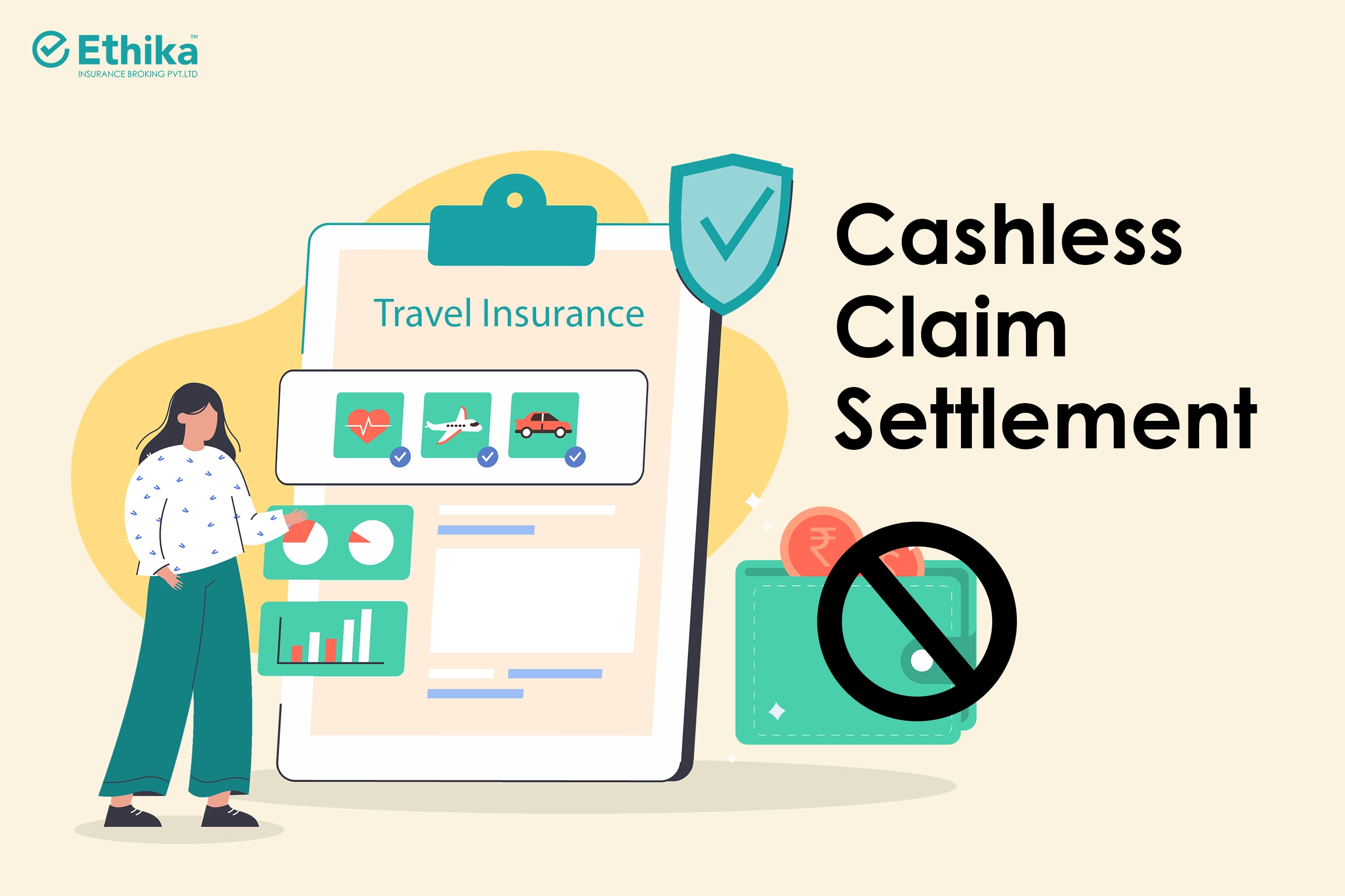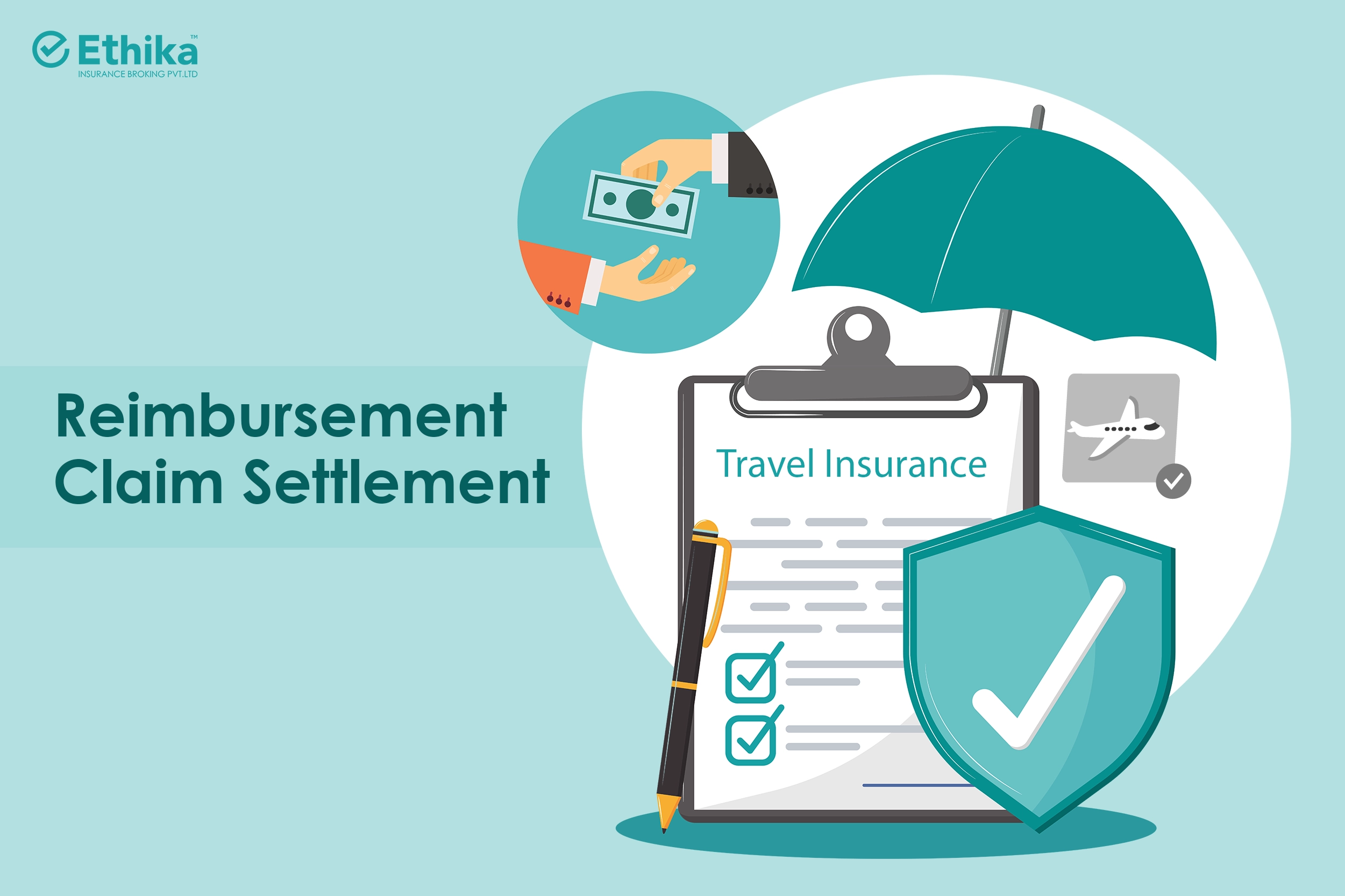Travel Insurance
100K+
Insured
450+
clients
4.9
Rating
100% Bootstraped
company
 Get a free review of your
Get a free review of your
policy today
We respect your privacy

Travel insurance comes with a lot of power packed features such as hospitalization cover, dental cover, reimbursement in case of loss of passports, tickets, checked-in baggage cover, cancellation of flight, hotel booking cover, delayed flight, missed connection, home contents cover, pet cover, repatriation cover etc. In addition to these there are other additional benefits which can be availed in travel insurance on payment of required premium. These add-ons include automated extension of the travel period, family plan, worldwide cashless facility, emergency cash, emergency ambulance cover, family ticket cover, cover for backpackers and solo travelers and roadside assistance.

Travel insurance is one of the sought after insurance products while traveling; particularly to a foreign location. This is due to the features of the product which includes health cover, dental cover and other support while traveling. The major benefits of travel insurance include affordable health and dental cover, personal liability coverage, legal expenses cover, reimbursement of personal belongings and cancellations and cashless hospitalization. On the other hand the major limitations of travel insurance include few network hospitals to avail cashless claim settlement facility, health insurance cover only for the travel period, limited coverage for pre-existing diseases etc. Let us understand in detail the benefits and limitations of a travel insurance policy:-

What is Travel Insurance?
So if you have a health insurance policy in India you could claim for any hospitalization anywhere in India, but while traveling abroad the same policy might not cover everything. Then it would be advisable to take a travel insurance plan that could cover all your medical expenses in a foreign location. The other advantage of taking a travel insurance policy instead of a health insurance plan is that it is quite cheaper. A travel insurance plan is 10X times cheaper than a health insurance plan in India whereas it would be more than 100X times cheaper compared to the health insurance plan abroad.
Readmore
One should note that a travel insurance policy is mandatory for many countries before entering their areas and they expect travelers to have a travel insurance policy before issuing a valid visa. While some countries even specify the minimum coverage to be taken before entering their space makes travel insurance even more attractive.
The most common illnesses or hospitalizations that could occur while traveling include upset stomach, road accidents, accidental injuries, dental issues etc. which would be costly in a foreign country. So it would be advisable to have a travel insurance policy before traveling to a foreign country. In addition to the medical expenses, travel insurance also covers the other claims such as loss of baggage, cancellation of flights, cancellation of hotels, missed flight, loss of passport and other important documents etc. under the same policy.
Travel insurance can be taken for a single trip or for a multi trip. Single trip policy is valid only for a particular period of time and before the expiry of the policy it is expected that the insured would be returning to the home country. But the concept is different in multi trip policy, in this one can travel multiple times during the policy period to a foreign location. The maximum number of days one can stay in a foreign location continuously is 180 days after which they have to return to the home country and then make the travel plans again. Multi trip policy is usually given for a period of 1 year and insured is permitted to make a claim during the policy period after satisfying the requirements of the policy. Show less

Travel insurance can broadly be
divided into 3 types
based on the location of travel,
scope of geographical coverage
and duration of travel.
Automated extension
Travel insurance plan can be extended in case of a medical emergency and evacuation or delay of a common carrier up to 30 days after getting necessary approvals from the insurance company. For instance, let us assume that Mr. A was traveling in Europe and during his stay in a hotel he fell ill and was admitted to the hospital. His travel insurance policy was due for renewal and he was not in a position to renew the policy. His health condition required him to be evacuated to a nearby hospital for advanced treatment. The travel insurance plan can be extended for up to 30 days in this case after getting approval from the insurance company. Travel insurance policy would expire on the last day and needs approval from the competent authorities to extend for a certain period of time. In another instance, let us assume that you have planned to return to India and your flight gets delayed due to bad weather. In such situations you can request for the extension of travel insurance policy for up to 7 days which could be granted by the insurance company paving way for you to utilize travel insurance coverage during your travel period.
Worldwide cashless facility
Travel insurance comes with the additional benefit of worldwide cashless facility in which the insured can avail cashless claim settlement facility in any of the hospitals abroad. The cashless claim settlement facility is available only for the network hospitals which are tied up with the insurance company. To avail the list of cashless hospitals in travel insurance please click on this link. This is the most important facility in travel insurance policy as it would be difficult to spend in dollars for medical expenses when people would already be traveling on a budget. Moreover one would take travel insurance to cover such unforeseen events and would not carry the amount that would be required in case of a hospitalization. Even a simple stomach upset can set you back by several hundred dollars. For this it is important to check with the insurance company if there are any cashless hospitals in the area you intend to travel to. Higher the number of cashless hospitals, better it would be in case of claim settlement.
Adventure Cover
Travel without adventure would not be fun for many of us, but the traditional travel insurance plans do not cover the losses from deliberate engagement in adventurous activities. So an add-on plan has been introduced which covers the adventurous activities of the insured while traveling. For example, the plan covers every possible mishappening while performing water, mountain, racing, or any other adventure sports. The policy covers the death of the insured or permanent total disability while engaging in any adventures during traveling. The add-on also includes accidental hospitalization up to a certain amount resulting from such adventurous activities. It is to be noted that this add-on only covers the injuries arising out of adventurous sports and doesn't cover the injuries caused while performing adventurous sports under the influence of intoxicants.
Family Ticket Coverage
Under this benefit, if a certified medical practitioner recommends that the insured should be accompanied by an immediate family member during the hospitalization period, then the travel insurance plan would cover the cost of one person to travel to the location of the insured in economy class in a flight. For instance, let us assume that Mrs. Dia was traveling to France on a business trip and was hospitalized due to a minor heart attack. The treating doctors have recommended that the insured can be accompanied by an immediate family member; in such cases the travel insurance plan would provide the one way economy class ticket to the immediate family member to visit the ailing insured during their hospitalization period.
Solo Traveler Cover
Solo travel can be all fun until you experience an unfortunate event such as loss of baggage including the documents and personal belongings. Under this section, the plan offers emergency travel assistance of up to Rs.1 Lakh abroad and Rs.50k in India - this money is to be used to return to your destination. In addition to this, the plan also provides for room rent accommodation in case of hospitalization which also includes the ICU rent. The plan also covers the instant blocking of credit or debit card in case of theft or unfortunate event.
Family Plan
Travel insurance can be given on a family floater basis in which the entire family would be covered under a single travel insurance policy. This makes it easy for the family members to manage their travel insurance policies. Family travel insurance plans generally include self, spouse, 2 dependent children and 2 dependent parents. If all the members in a family are traveling to a common destination, then it would be meaningful to take a single family travel insurance policy with the required coverage. A minimum of 4 members would be covered under the plan and can be extended depending on the number of immediate family members traveling. The advantage of family floater travel insurance plans is that the sum insured would be floating among the insured members which reduces the overall premium outgo. This is similar to the family floater health insurance plans in which the sum insured floats among the insured members. It is important to note that most family travel insurance plans do not cover the pre-existing ailments or adventure sports.
Emergency cash
Emergency cash cover in travel insurance policy provides emergency cash in case of an emergency such as theft, dacoity, loss of wallet etc., which can be used to book flight tickets and pay for alternative accommodation. For instance, let us assume that you are walking at night in New York city and while crossing a lane you were robbed. Now neither do you have cash, nor an identity. In such situations, travel insurance policy helps you with emergency cash which can be used to book return flights or avail hotel accommodation thereby giving you extra time to arrange extra funds. These emergency funds would be given to the insured in good faith and in general do not require any major documentation.
Emergency Ambulance Cover
Travel insurance plan provides emergency ambulance cover to transport the insured from the spot of accident to a nearby hospital. In case of emergencies which require repatriation to India to evacuation to a nearby hospital the travel insurance plan also provides air ambulance cover. This would be useful when you are traveling in an unknown territory and where it would not be possible for the road-borne vehicles to reach. Air ambulances are very common in developed countries and are used to evacuate the injured people from the accident site to the nearby hospitals in a short time.
Backpacker Cover
This add-on covers the backpackers traveling in a foreign location with coverage varying from one insurance company to another. Under this plan, one can avail instant blocking of credit or debit cards thereby eliminating the hassle to coordinate with different banks. The benefit also offers free replacement of PAN cards, and covers the travel and hotel expenses, and temporary replacement of smartphones to provide temporary access in order to reach friends and family. Backpack cover would be very useful to travelers who lose their belongings while on a trip and is also affordable.
Roadside Assistance Cover
Roadside assistance covers the common travel related issues such as vehicle breakdown, flat tyre, battery issues, loss or keys etc. For instance, under this plan you can avail roadside assistance if your vehicle has a discharged or flat battery, including wrong fuel leading to damage of the engine, stolen keys or broken locks by miscreants, assistance over the phone for minor issues which can be handled by the insured, taxi benefit to travel to the location or hotel benefit to book hotel for stay till the vehicle is repaired.
Travel insurance can be taken on an individual basis or as a group. Corporate companies also take travel insurance for their employees when they send them on an official trip to a foreign location. This is very important for the employees as well as the employer as the employees would not be able to adjust the required funds immediately in case of a hospitalization without a travel insurance plan. Companies which provide travel insurance plans to their employees can boost the morale of their employees leading to increased productivity. Once the employees take a travel insurance plan, they would be free of tension related to hospitalization in a foreign country. Readmore

In addition to the hospitalization expenses , travel insurance also covers the loss of documents, passport, tickets, cancellation of flight, delay of flight, cancellation of hotel, emergency expenses etc. Companies can take a corporate travel insurance plan which covers all the employees traveling to a foreign location and it is considered as a master policy where the employer would be given the link to enter the details and download the policy whenever an employee is traveling. For this, the employer is expected to maintain a minimum balance in the cash deposit account of the insured or pay whenever a new policy is taken. This also eliminates the administrative expenses incurred by the employer if different policies are taken each time when an employee travels. Show less
Affordable health cover
Travel insurance policy is intended to cover the hospitalization expenses due to an accident, illness or disease while traveling to or in a foreign location and is considered the best alternative for a health insurance policy during the travel period. For instance a health insurance policy for USD 5,00,000 would cost USD 2500-3000 in the USA whereas the same cover is available for USD 100 in a travel insurance policy which clearly shows the affordability of travel insurance when compared to the health insurance policy. The necessity of having a health insurance cover is high in western countries as there is no government support for travelers in case of hospitalization. In developed countries the first thing hospitals ask is the health insurance policy before admitting in the hospital, if there is no health insurance policy then it would be difficult to get treated in most of the hospitals. This is due to the fact that the USA is one of the few countries which charge high for any health related treatments. It would be hard to predict the chance of falling sick while traveling or staying in a foreign country and one needs to have a backup in terms of travel insurance policy to cover the unexpected expenses.
Inbuilt dental coverage
Another important benefit in a travel insurance policy is the affordable dental cover. In developed countries the second most costliest thing after hospitalization is the dental expense which can run into a few thousand dollars for a simple procedure. Dental treatment is very costly in western countries and due to this reason the health insurance plans in those countries cover the dental related expenses as well. In India, we can hardly find health insurance plans covering the dental expenses as they are nowhere expensive when compared to hospitalization expenses. One can avail affordable dental cover in a travel insurance plan, but the plan covers the dental expenses only in case of an accidental injury leading to dental treatment. Travel insurance doesn’t cover the regular dental checkups, cosmetic treatments or if the insured is visiting the dental hospital solely for the purpose of availing dental treatment which can be postponed for a certain period of time till his/her return to India.
Covers Personal liability
Personal liability is when a person is responsible to pay for the loss or damages incurred to a third party. Personal liability arises out of bodily injury or property damage of a third party from the actions of the insured. Personal liability claims are rampant in developed countries which could at times run up to millions of dollars in claim settlement amounts. For instance, let us assume that you have hit a person by mistake and they fall down leading to hospitalization. Now the injured person can sue you for the damages caused and it would become your personal liability to make good of the damage to that person. The liability under the personal liability claims should be legally enforceable to get the claim settled. Let us take another example, you are traveling to America and are staying in a 5-star hotel during your trip; by mistake you break the vase in your room;it then becomes your responsibility to replace the product. The hotel can sue you for this and you would be made to settle the amount failing which could lead to imprisonment. A travel insurance policy can address all such issues where personal liability comes into play.
Reimbursement of personal belongings & cancellations
The other benefit of travel insurance policy is that it reimburses the cost of lost personal belongings. For instance, a travel insurance policy reimburses you in case of hotel cancellation, flight cancellation, loss of tickets, travelers cheques, loss of passport, missed connection of flights etc. Travel insurance makes sure that your monetary loss would be reimbursed even if your mental peace is not. When your flight is canceled it would be difficult for you to book another flight and two things could disturb your travel plans; one is the extra cost of rebooking and the other is the mental agony due to cancellation.
Legal expenses
When traveling in a foreign country there are chances that one might land up in their legal system due to some unintended consequences. In such cases the travel insurance would reimburse the legal expenses, provide for bail bond and other such related expenses up to the specified sum insured limit. It is to be noted that the legal expenses would cover civil related disputes only and not criminal cases. For instance, if you are over speeding while traveling in the USA, you might be asked to pay a fine and failing would land you in trouble. You would be produced before court for verdicts and since it is a bailable offense you could take bail and the cost of bail bond including lawyer fees would be settled by the insurance company.
Cashless hospitalization
The other major advantage of having a travel insurance plan is that it offers cashless hospitalization in case of claim settlement. One can visit the network hospitals in a foreign country and avail cashless claim settlement services for any hospitalization arising out of illness, disease or accidents. It is important to note that cashless hospitalization would be available only in the network hospitals tied up with the insurance company. Availability of cashless hospitalization could be the best option for anyone as the cost of hospitalization is very high and one would be unable to settle such high amounts from their pocket. In addition to cashless hospitalization the policy also covers the reimbursement of medical expenses wherever the cashless facility is not possible.
The major disadvantage or limitation of a travel insurance is that there would be few or limited number of network hospitals. Since the insurance company is based in India, it would have only few network hospitals in a foreign country due to various reasons. This could be a major hindrance for people depending solely on a travel insurance policy. The few network hospitals might also be in a different location which might be inaccessible to you in case of an emergency. Keeping all these things in mind one should consider the travel insurance policy that has the maximum number of network hospitals in the location you are traveling to. In case of planned treatment one can travel to a nearby network hospital, but in case of an emergency it would not be feasible to travel to a network hospital far from your area. So, you would be forced to go for a reimbursement option in which you settle the hospital bill and later claim from the insurance company.
Travel insurance policy is only a temporary health insurance cover. One cannot depend completely on a travel insurance policy for their health insurance requirements. For example, let us assume that you don’t have a health insurance plan in India, but have opted to take a travel insurance plan before traveling to the USA. One day while chilling on the beach in the USA you had a minor heart attack which was diagnosed by the local hospital, who in turn advised you to undergo treatment. When enquired you found the cost of treatment in the USA to be way beyond your travel insurance cover and so decided to get treated in India where it is affordable. But in India also the cost of treatment would need you to break your fixed deposits and sell some of your properties. So, the travel insurance policy can never be an alternative to a permanent health insurance policy. Utmost it could be a temporary health insurance cover when you are traveling in a foreign country.
The other limitation of travel insurance policy is the pre-existing coverage. Travel insurance policy doesn’t cover the hospitalization expenses incurred due to certain pre-existing conditions unless it is a case of emergency and life threatening. For instance, you have traveled to Canada with a kidney condition which is pre-existing before taking the policy and you develop complications in Canada due to unknown reasons. In such cases the travel insurance policy would cover the treatment expenses only if it is life threatening or an emergency, otherwise you need to cut short your trip and get treated in India as it is a pre-existing condition which would normally not be covered under the travel insurance policy.
The other limitation of the travel insurance policy is the health and dental cover under the policy is valid only during the travel period. Beyond the travel period the cover would not be valid and you should be self financing or take a health insurance policy. For instance, in case of single trip policies, the cover would start from the time you depart and end by the time you return to India or before the expiry of the policy period, whichever is earlier. The travel period can be extended by writing to the insurance company or the insured can take a new travel insurance policy to cover the remaining period. In case of multi trip policies, the policy period would be 1 year and the insured can make any number of trips within the policy period, the cover would be valid for the entire policy period.
Travel insurance is not an alternative to health insurance but can be considered as an extension of health insurance while traveling to a foreign location. All the benefits in a health insurance plan are covered under the travel insurance policy and certain other benefits such as loss of passport, tickets, cancellation of flights, hotel booking etc are also covered. The other limitation is the travel insurance policy doesn't cover the self-inflicted events leading to hospitalization. It also doesn't cover the alternative treatments such as allopathy. Ayurveda, Unani, Siddha and Homeopathy. Expenses incurred for cosmetic surgery is also not covered under the policy unless it is necessitated due to an accident.
Pre-existing disease (PED) means any condition, ailment or injury or a related condition (s) for which the insured has been experiencing symptoms or signs, and/ or the insured was diagnosed or the insured had undergone treatment or medical advice within 48 months prior to the inception of the first insurance policy. Once the policy is lapsed the accrued benefits such as PED benefit would be lost and the insured has to wait for the specified period before making a claim again. In such cases, any condition before taking a new policy would be treated as a Pre-existing condition and processed accordingly. Readmore

Unlike the life insurance plans, travel insurance plans cannot be reinstated and continued with the same benefits. This makes it more difficult to renew a health/ travel insurance plan after it is lapsed. Most of the travel insurance plans would cover certain pre-existing conditions after they are declared in the proposal form and opted for PED waiver under the policy. It is worthwhile to buy a travel insurance policy with PED inbuilt cover.
Let us take an illustration, Mr.A & Mrs.A are planning to visit the USA for their son’s convocation ceremony and have taken a travel insurance policy for $5Lakh from XYZ insurance company. Mr.A was under medication for High blood pressure and had declared the same in the proposal form whereas Mrs. A has a skin condition where she would suffer allergy if exposed to sunlight for an extended period of time. Mrs. A didn’t declare this condition in the proposal form thinking it is not necessary as she had not used any medication for it. One day Mr & Mrs. A went to a beach with their son and there Mrs.A developed skin allergy and was admitted to hospital for treatment. To her surprise her claim was rejected by the insurance company stating that she was well aware of her condition before taking the policy but failed to mention it in the proposal form which is a gross violation of the insurance principle of “Utmost Good Faith”. Had Mrs. A declared her condition in the policy, she would have been covered if they had opted for PED cover under the travel insurance policy.Show less

Pre-existing conditions in travel insurance are generally excluded from the scope of coverage but there are certain insurance plans that cover the PED conditions in case of an emergency or a life threatening situation. The concept of life threatening situation is interpreted differently by different insurance companies as there is no proper definition for the same. Everyone would agree that heart attack is a life threatening situation which would be covered as a PED but there are certain instances such as seizures, allergies and asthma etc. which could turn to be fatal if proper treatment is not provided within the defined time period. Here are certain court rulings regarding Pre-existing condition cover in India: Readmore
Overseas travel insurance
Overseas travel insurance covers the medical expenses of the individuals and families traveling abroad. The range of benefits under the policy include hospitalization expenses due to an accident, illness or disease, dental expenses, legal liability due to third party damages, loss of passport, loss of documents and tickets, cancellation of flights, missed connection, delay in flights, cancellation of hotel, loss or damage of checked-in baggage etc. Overseas travel insurance policies are mandatory for people traveling to foreign locations and some countries mandate having travel insurance before they issue a visa. Overseas travel insurance covers all countries including USA & CanadaWest, which makes it critical, considering medical expenses in the West.
Schengen travel insurance
Schengen travel insurance is a special type of travel insurance policy which is usually taken while traveling to Schengen countries. Schengen countries are a group of 26 countries, 22 of which are in Europe. The Schengen visa requires a valid travel insurance policy with at least EUR 30,000 and should cover all the member countries of the Schengen area. Schengen visa is a short-stay visa that allows one to stay, travel in any of the Schengen countries for up to 90 days for business and leisure. It should broadly cover any expenses arising out of medical reasons including repatriation, dental expenses and emergency treatment in hospitals including death. The sum insured in Schengen travel insurance is in Euro as it is the authorized currency in the Schengen area. It is important to note that a Schengen visa is not mandatory for everyone traveling to Europe, but everyone applying for a Schengen visa needs to possess a Schengen travel insurance policy. Foreign travelers who enjoy visa free travel to the Schengen area can choose to take a policy that covers their medical expenses in case of an emergency.
Senior Citizen travel insurance
Senior citizen travel insurance was launched to cover the hospitalization expenses of the senior citizens while they are traveling in a foreign country. The requirements of senior citizens are a bit different to normal people as there are high chances that senior citizens would be suffering from a pre-existing disease. Normal travel insurance policies limit the upper age at 60 years in most cases and it would be difficult for senior citizens to get these plans and moreover these plans come with a condition of no cover for PED unless it is a life threatening condition. So, senior citizen travel insurance plans had to be designed to cover the requirements of them such as the PED. A senior citizen travel insurance plan would cover the PED in certain cases and would cost higher when compared to normal travel insurance plans. Senior citizen travel insurance plans usually have an upper limit of 85 years. It is important to read the terms and conditions of the plan thoroughly before taking it as it would have hidden conditions such as co-pay and sub limits.
Domestic travel insurance
Domestic travel insurance is usually given when the travel is made to a specific location within the country. For instance, domestic travel insurance policies are famous while traveling in airplanes, trains and buses which would be trip based policies covering the loss of life or bodily injury including the loss of valuables such as checked in luggage, passport, tickets, etc. The primary reason for taking a domestic travel insurance policy would be the risk of financial loss in case of loss of baggage, cancellation of flights, delay of flights, loss of belongings etc. The hospitalization expenses that are covered under a domestic travel insurance can be availed through a health insurance plan which is valid throughout India. Most of the time we see travel insurance being offered in travel web aggregator companies as well as IRCTC which is valid for the period of travel. The other advantage of taking a domestic travel insurance policy is to avail personal liability cover which covers your legal liability in case of damage to a third party resulting from your actions.
Student travel insurance
The famous type of travel insurance is Student travel insurance. Every student traveling to a foreign country is required to have a policy that could cover their medical expenses in case of an emergency. Students in foreign locations would get medical insurance once they enroll in the college and it would cover their medical expenses in case of any emergencies, but during their travel to a foreign country and before joining the college they need to get themselves covered adequately which would be done with a travel insurance policy. Student travel insurance policies are aimed to provide travel insurance cover to students only and are in general cheap compared to other types of travel insurance plans. Student travel insurance policy covers the medical expenses including hospitalization, dental expenses, repatriation expenses, loss of passport, tickets, check in baggage, cancellation of flights, hotels, hijack distress allowance etc.
Travel insurance plans which cover the rest of the World excluding USA & CANADA are intended to cover the travel except for these 2 countries and Schengen countries. These plans are relatively cheaper as the medical expenses are cheaper in countries where this plan is valid. USA & Canada are the countries with the highest medical inflation as well as expensive medicare. So insurance companies have launched plans that cover travel to countries other than the USA & Canada. These plans are relatively cheap and have the highest coverage, one can take them for up to 360 days at most after which they have to be renewed.
Schengen travel insurance as explained above is designed to cater to the requirements of people traveling to Schengen countries only.
If you are traveling to Asian countries alone, then you do not need a Schengen or USA & Canada travel insurance plan as it would only increase your premium and is totally unrelated to your travel. Hence, you would take a travel insurance plan covering only Asian countries such as China, Thailand, Cambodia etc. These countries have affordable and low cost health care systems when compared to Schengen or the countries in the West and are therefore cheaper in price. This travel insurance plan should be taken only if your destination is within the Asian countries as this plan would not cover your travel to a Schengen country or USA & Canada.
The other travel insurance plan that is designed on the basis of geography is the plan covering your trip to USA & Canada. If you take a travel insurance plan that covers USA & Canada then the plan would be valid throughout the World. For instance, if you have made a travel plan which includes Singapore and then USA, then you should take this plan which covers your trip anywhere in the World. These plans are a bit higher in premium due to their coverage worldwide.
Single trip travel insurance
Single trip travel insurance plan provides protection against unforeseen circumstances including hospitalization expenses, loss of valuables such as passport, documents etc, cancellation or delay of flights, hotels etc. during a single trip. The coverage is valid from the time the insured leaves the base location and returns to the base location within the valid time period mentioned under the policy. For instance, if you want to travel to the USA on business or leisure for a period of 15 days and then return back to the base country, Readmore
then you can take a single trip travel insurance policy as the policy would be valid for the time between to and fro to the base location. Once you reach the base location, the policy expires and you need to take a new policy for another trip. Single trip travel insurance would also be valid if a person is moving to a foreign country and there is no return in the foreseeable future, the policy would be valid for a certain period of time as mentioned in the policy period. Show less
Multi trip travel insurance
Multi trip travel insurance is intended to cover the multiple trips to a foreign country within the policy period. Under multi trip travel insurance one can make any number of trips during the policy period but the maximum number of days one can stay in a foreign location is 180 days within which they had to return to the base location. It is useful to people who make frequent trips to foreign countries for a limited number of days. For example, let us assume there is a famous doctor in India who needs to travel to the USA every month and stay there for a certain number of days, Readmore
In such cases the doctor needs to take a multi trip travel insurance policy which allows him/her to make any number of trips during the policy period. In general multi trip travel insurance plans are given for a period of 1 year after which they have to be renewed. One can go to a foreign location and come back to their base location any number of times within the one year policy period by not staying for more than 180 days in a single trip in foreign location. If one stays more than 180 days then the policy would not be valid unless approved by the insurance company. The scope of coverage under the multi trip travel insurance plan would be according to the selection of the insured. Show less
Group travel insurance
Group travel insurance is an application of travel insurance in which a group of people together would be given the travel insurance. For example, a group of players traveling to the USA to represent India would be given a group travel insurance plan under which all the insured members would be covered. It is done to avoid the hassle of maintaining multiple policies which is similar to the group personal accident and group health insurance policies. Group travel insurance plans are underwritten keeping the group characteristics in mind and therefore represent the interests of the group.
One can take any type of travel insurance policy based on their needs and requirements but it is important to declare the information correctly before taking the travel insurance policy otherwise one should be ready to expect surprises at the time of claim settlement. In particular, pre-existing conditions should be clearly mentioned in the proposal form so that it doesn't hamper your claim settlement chances in times of need. Even Though PED is covered in case of life threatening and emergency situations there is no proper definition of life threatening and emergency situations which could lead to rejection of claims or litigation of claims. For more information on travel insurance plans please book a call with our travel insurance experts at Ethika insurance broking.
Most of the travel insurance plans come with a sub-limit for the medical expenses that too only in case of a life threatening condition arising out of a PED. The sub-limits would be different for different insurance companies. Here is a list of insurance companies and their sub-limits

Chola MS overseas travel insurance plan covers the entire medical expenses due to PED up to sum insured limit in case the PED extension (optional) cover is purchased on payment of additional premium. In such cases the liability of the insurance company would be the actual medical expenses incurred by the insured for such treatment or the sum insured, whichever is lesser.

TATA AIG’s overseas travel insurance policy covers the medical expenses arising out of a pre-existing condition or any complication in a life threatening situation would be covered up to $1500 per policy.

Care Health insurance covers the PED claims in case of life threatening situations up to 10% of the sum insured.

Bajaj Allianz travel insurance covers the PED claims in case of life threatening situations up to $1000 per policy.

Reliance travel insurance covers the PED claims in case of life threatening situations up to 1% of the sum insured up to a maximum of $10,000 for medical expenses including Transportation, Evacuation and Repatriation of mortal remains.
The Pre-existing conditions in a travel insurance policy would change from one insurance company to another and it is very important for customers to check the eligibility of coverage in case of life threatening conditions under the PED before taking a travel insurance policy. One can get in touch with our travel insurance experts at Ethika insurance broking to understand the Pre-existing sub-limits in a travel insurance policy and choose accordingly.
For more details on the travel insurance policy benefits and limitations please book a call with our travel insurance expert at
Ethika insurance broking and get the advantage of multiple quotes from multiple insurance companies and select the best among them.
Travel insurance covers medical expenses and other travel-related misfortunes such as loss of luggage, passports, delayed flight, hotel issues, etc. It reimburses the insured in case of any loss during the travel period. The main intention of taking a travel insurance policy is to get adequate health insurance coverage during your travel period in a foreign country, as your local health insurance might not be applicable or sufficient to cover your hospitalization expenses incurred in a foreign country. Travel insurance can be taken for any travel purposes, such as educational, leisure, or business. Hence, it is important to understand the claim settlement process in the case of the travel insurance policy.

The cashless claim settlement option is available only for the hospitalization expenses incurred during your policy period. The policy period in travel insurance starts with the date of the journey to a foreign country. It ends after reaching India or as per the visa period or the tickets booked for the return period. The travel insurance policy covers hospitalization expenses incurred due to illness, accident, or injury up to the coverage specified in the policy. To avail of the cashless facility, the insured should inform the insurance company immediately regarding the hospitalization arising from illness or disease. The insurance company would then provide the list of cashless hospitals in your nearby area which can be chosen to avail cashew claim settlement facility.
The next step is to visit the hospital offering a cashless claim settlement facility and submit the policy copy at the insurance desk. Hospital staff would then process the claim after consulting the insurance company to verify the authenticity of the policy and get cashless approval for hospitalization. Now, the insurance company would verify the health records of the insured admitted to the hospital and then decide on the admissibility of the claim. Insurers can accept or deny the claim depending on the terms and coverage offered under the policy.
Once the claim is accepted, the hospital will start the treatment cashless. After the treatment, the insurance company would settle the claim amount directly with the hospital, and any amount over and above the claim amount, i.e., deductibles or extra amount, should be settled by the insured directly with the hospital.
In the next step, the hospital will share all the original documents with the insurance company for their record. The insured can then proceed with their travel plan. In case of necessity, the travel insurance plan also offers repatriation services, which are only shifting the patient to India for treatment purposes. A travel insurance policy covers the air ambulance service.

Note: Pre-existing disease-related hospitalization is covered in a travel insurance plan only if it is life-threatening. Click here for more details on PED coverage in travel insurance.
The reimbursement claim settlement option is when the insured customer avails of the hospitalization by paying the required amount and then claims the amount from the insurance company. In reimbursement, the insurance company would process the claim post-discharge and treatment, whereas in cashless mode, the insurance company would process the claim pre-discharge or immediately before discharge. The first step in case of reimbursement claim settlement is to inform the insurance company about the claim. The claim can be intimated before admission or after admission to the hospital. In an emergency, the intimation can be done after discharge or at the time of treatment. Insured need to provide brief details of the hospitalization, such as the reasons for hospitalization, hospital admission, approximate claim amount, etc.
The next step in the process is to avail the treatment from any of the hospitals except those blacklisted. The cost of a trip to hospitals that are blacklisted would not be covered by the policy on travel insurance. Once the claim is intimated to the insurance company, a claim reference number would be generated which can be used to track the claims going further. The claim's reference number can be used to obtain admission to a hospital for treatment. It is important to remember that one should go for claim reimbursement only when the hospital is not a network hospital. If the hospital is a network hospital and you still decide to go for reimbursement without any valid reason, then the insurance company would apply a copay of a certain percentage before settling the claim.
After availing of the treatment and discharge, the insured should collect all the claim-related documents such as discharge vouchers, treatment bills, treating doctor's prescription, and advice for diagnostic tests. In case of baggage loss, flight delay, hotel cancellation, and other travel-related cases, one can claim on a reimbursement basis. One claim number would be enough to claim for more than 1 section under the travel insurance policy. For example, if you want to claim for both flight and hotel cancellations, you can do so by raising one claim id instead of 2 claim ids.
The next step is to submit all the related documents and duly filled claim settlement forms to the insurance company to process the claim. Once the documents are submitted, the insurance company will process the claim within the permissible period and deposit the amount in the policyholder's account. You should submit a canceled cheque with your bank account details for this. The claim's reference number can be used to obtain admission to a hospital for treatment.

It is important to note that only the hospitalization sections of the policy, including dental treatment, are covered on a cashless & reimbursement basis. In contrast, other sections are covered on a reimbursement basis only.
Cover |
Available |
Preferable |
|---|---|---|
| Medical expenses and medical evacuation including repatriation | Reimbursement & Cashless | Cashless |
| Dental cover | Reimbursement & Cashless | Cashless |
| Personal Accident | Reimbursement | Reimbursement |
| Total loss of checked-in baggage | Reimbursement | Reimbursement |
| Accidental death & disability (Common carrier) | Reimbursement | Reimbursement |
| Emergency cash benefit | Reimbursement & Cashless | Cashless |
| Daily allowance in case of hospitalization | Reimbursement | Reimbursement |
| Compassionate visit | Reimbursement | Reimbursement |
| Return of minor child | Reimbursement | Reimbursement |
| Loss of passport | Reimbursement | Reimbursement |
| Personal Liability | Reimbursement | Reimbursement |
| Hijack distress allowance | Reimbursement | Reimbursement |
| Trip delay | Reimbursement | Reimbursement |
| Hospitalization daily allowance | Reimbursement | Reimbursement |
| Golfer’s Hole-in-one | Reimbursement | Reimbursement |
| Trip Cancellation | Reimbursement | Reimbursement |
| Trip Curtailment | Reimbursement | Reimbursement |
| Delay of checked baggage | Reimbursement | Reimbursement |
| Home Burglary cover | Reimbursement | Reimbursement |
| Missed connection | Reimbursement | Reimbursement |
| Difference in air fare due to delayed or early return | Reimbursement | Reimbursement |
| Bounced Hotel | Reimbursement | Reimbursement |
| Emergency hotel extension | Reimbursement | Reimbursement |